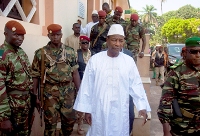By Jaya Ramachandran
IDN-InDepth NewsAnalysis
BRUSSELS (IDN) – Hardly one year after the election of Alpha Condé as President of Guinea, the West African state is faced with a rather vulnerable situation that political analysts fear may open the army’s way back to power.
“Condé’s accession to power provided an extraordinary opportunity to end 50 years of authoritarianism and economic stagnation. The new government faces immense challenges with limited means, even if donors seem prepared to increase aid,” warns the International Crisis Group (ICG) think-tank based in Brussels.
The failure of the July attempt against the president’s life indicates that, for the moment at least, it has the military hierarchy’s support. Condé has consolidated the normalisation process begun by his predecessor, General Sékouba Konaté, and sent the army back to the barracks and away from Conakry. But the situation is far from encouraging.
“The legacy of Condé’s election is cause for some concern because it gave new impetus to the idea that Guinea’s history is a struggle between its four major ethno-regional blocs,” says Vincent Foucher, Crisis Group’s Senior West Africa Analyst. “Moreover, Condé has done too little too late to promote reconciliation and dialogue with the active opposition.”
The legacy of Condé’s election is cause for anxiety, including for the legislative contests, because it gave new impetus to the idea that Guinea’s history is a struggle between its four major ethno-regional blocs in a population of 10 million. The largest and most prominent groups are the Fula (French: Peul, comprising 43%, Mandinka 35%, and Susu 20%
An analysis by the Crisis Group, headed by Louise Arbour, former United Nations High Commissioner for Human Rights, says: In the first round, most politicians started by organising their own communities. The second round – during which ethnic rhetoric built steadily on all sides – was a scarcely disguised debate on supposed Peul domination, with Condé, a Malinké, attributing hegemonic ambitions to that community from which his opponent and the main opposition party leader, Cellou Dalein Diallo, comes.
“Although the security forces were responsible for the worst violence, political mobilisation along ethnic lines sparked clashes and claimed victims. Organisational weaknesses of the electoral process fed these tensions by allowing mutual accusations of fraud at every stage,” adds the report published on September 23.
The study, titled ‘Putting the Transition Back on Track’ adds: “The new government has done little to cope with this grim legacy and been slow to organise the legislative elections, which are indispensable for completing the institutional arrangements required by the constitution.”
In fact, it kept quiet for months about the elections procedure, until, on September 15, the Independent National Electoral Commission (INEC) suggested they be held on December 29, 2011. However, the authorities had already begun to overhaul the electoral register, made changes to the INEC and redefined the division of labour between it and the territorial administration ministry.
The National Transition Council, an interim legislative body, and civil society tried to mediate, and under domestic and international pressure, the authorities finally called for consultations and abandoned the creation of a new electoral register. “The initiation of a dialogue has not so far enabled any agreement on the bones of contention: the composition and functioning of the INEC, the electoral register and the elections date,” the report says.
It urges the international community, which partly withdrew after Condé came to power, to accompany this final stage of the transition, providing guarantees for the legislative elections as it did for the presidential election.
“The Economic Community of Western African States (ECOWAS), the African Union (AU) and the UN must reinvest vigorously in Guinea to preserve the gains acquired since the demise of Lansana Conté’s regime in December 2008 and the removal of the military junta led by Captain Moussa Dadis Camara in January 2010. Unfortunately, the democratic transition in Guinea is not irreversible,” warns the Crisis Group.
The report offers a set of 24 recommendations to halt the process of “putting the transition back on track”.
President Condé is asked to:
– Engage in direct and periodic political dialogue with the leaders of the most important parties (those that received more than a certain percentage of the votes in the first round of the presidential election, 5 per cent, for example), at least until the legislative assembly is in place.
– Refrain from ambiguous and dangerous rhetoric accusing unidentified citizens of “sabotaging” government actions; avoid misusing his prestige as an opponent of authoritarian regimes as justification to avoid the political debate that is indispensable for a democratic system; and take a clear public stand against the ethnically-laden provocative speeches by some of his allies and supporters.
– Avoid any political statement which may be understood as interfering with the judicial process for investigating the July 19 attack.
The Guinean Government is urged to work with opposition parties, especially the Union of Guinean Democratic Forces (Union des forces démocratiques de Guinée, UFDG) and the Union of Republican Forces (Union des forces républicaines, UFR), to seek a genuine consensus about the electoral process, including the calendar, the voters register and the Electoral Commission.
President Condé’s government should also continue to accept the National Transition Council (NTC) as a legitimate legislative partner until the National Assembly starts functioning, as set out in the constitution, says the report.
It should also prepare draft organic bills on the institutions required by the constitution, especially the Supreme Judicial Council, the Supreme Court and the Economic and Social Council.
To the opposition parties, on their part, should accept government proposals for dialogue on the electoral process and other important issues without insisting that strict observance of the constitution is the answer to all the country’s problems, play a constructive role in the NTC and use this forum to defend their positions, and cease questioning the legitimacy of President Condé’s election. [IDN-InDepthNews – September 25, 2011]
2011 IDN-InDepthNews | Analysis That Matters
Follow us on Twitter and Facebook:
http://twitter.com/InDepthNews
http://www.facebook.com/pages/IDN-InDepthNews/207395499271390?sk=wall

